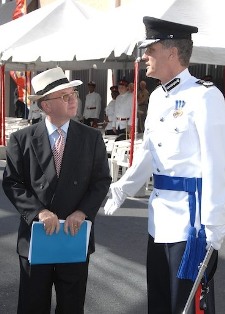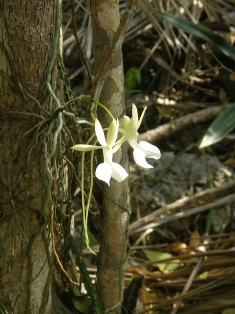Archive for May, 2011
Local lawyer’s book acquired by Portuguese publisher
(CNS): Work by local lawyer, armature historian and author Peter Polack is about to be published in Portuguese by Sextante, an imprint of the largest Portuguese publishing group Porto Editora. A significant African history book, Black Stalingrad by Peter Polack, is about the Battle of Cuito Cuanavale, Angola (1987-1988), in an obscure war that appeared to herald great changes in southern Africa as well as the end of the apartheid government in South Africa. Polack has previously released a list of Cuban casualties of the Angolan war published in the Miami Herald and written an opinion editorial for the South Africa Times on Cuito's fallen.
He has also been interviewed about the book by the Portuguese service of Voice of America.
The Portuguese edition of the book is to be published and distributed throughout Portugal and Lusophone Africa in the summer of 2012 on the 25th anniversary of the Battle of Cuito Cuanavale.
Polack says his interest in Angola was sparked by a meeting in 1992 with two Cuban refugees who had fought in Angola. He then made a trip to Cuba itself where he acquired several books on the war in Angola. "This was when I first heard about Cuito Cuanavale" and the battle that took place there in 1987 and 1988 where two superpowers, the United States and the Soviet Union, "collided in a monstrous battle fought by their satellite nations of Cuba and South Africa who were assisting" Angolan groups.
The battle was significant, Polack says, because it represented the last major incursion in Southern Africa by Russia and USA, the start of the Angolan peace process, the end of Cuban international intervention, and the end of the cold war.
He says the battle itself is of great interest because no non-Cuban, South African, Angolan, Soviet or US author has written an objective, accurate, politically neutral and readable version of the fighting, because it is one of the last major land battles of this century described variously as the largest single conventional military engagement on the African continent since the Battle of Al Alamein, as the African Stalingrad or Angola's Verdun.
Peter Polack was born in Jamaica in 1958 and has been a criminal lawyer in the Cayman Islands since 1983 where he resides with his wife and two daughters.
In July 2005 he organized a Cuba relief shipment after Hurricane Dennis from generous donors of the Cayman Islands. He visited Cuba for the first time in June 2009.

Police hunt for third man in West Bay stabbing
(CNS): One man is in hospital with non-life threatening injuries, another in custody and a third on the loose following an altercation in West Bay on Tuesday evening. Police have confirmed that a man who has been arrested was stabbed in the shoulder during a fight that took place in Batabano Plaza at around 7:40pm last night and one man who received a bloody nose has also been arrested. The RCIPS were called to the location of the incident after reports were made that one of the men was brandishing a firearm. A search of a car beleived to have been used by the suspects was searched and ammunition was recovered.
With investigations continuing along with the hunt for the third man, the police said that so far they were receiving very little co-operation from the men reportedly involved in the fight.
Anyone who may have witnessed the incidentor wo can help identify those involved in the altrcation is asked to contact West Bay police station on 949 3999

MLAs plan to blockade GT
 (CNS): The opposition representative for East End and the independent member for North Side have sounded the alarm that government is pressing ahead with the East End cargo port and called on the people to join them in a full scale blockade of George Town to demonstrate the country’s opposition. Given the results of the developer’s environment report and the announcement on Monday that the premier still intends to approve the plan, Arden McLean and Ezzard Miller have warned of the serious need to stop the project before it is too late. With the support of their constituents in both the districts, a commitment from local quarry owners and truck owners, the MLAs are planning a full scale demonstration.
(CNS): The opposition representative for East End and the independent member for North Side have sounded the alarm that government is pressing ahead with the East End cargo port and called on the people to join them in a full scale blockade of George Town to demonstrate the country’s opposition. Given the results of the developer’s environment report and the announcement on Monday that the premier still intends to approve the plan, Arden McLean and Ezzard Miller have warned of the serious need to stop the project before it is too late. With the support of their constituents in both the districts, a commitment from local quarry owners and truck owners, the MLAs are planning a full scale demonstration.
At a public meeting in North Side Tuesday evening McLean and Miller stated that the need to put a stop to the project was greater than ever. Pointing to the Throne Speech delivered by the governor in the Legislative Assembly Monday morning in which the cargo port was the only major public/private development project other than the cruise terminal cited by government as planned for this year, he called on the people to join the planned demonstrations.
With no mention of the Hon special economic zone or the plans for Dr Devi Shetty hospital, Miller said he believed this was a clear indication that the premier was prioritizing Joe Imparato’s plan for the East End Sea Port — which was nothing more than a disguised major quarrying project – as something he believed he could get off the ground.
“We need to continue and intensify our opposition to this project if we are to successfully stop it,” Miller said. He warned that, based on the government’s track record, the legislation to create the exemptions for the commercial port development project from taxes and other planning regulations could come to the House suddenly and without warning.
As a result, the MLAs were formulating a plan that would include as many people as possible to be ready to come to George Town with trucks to block the roads around the parliament building at a moment’s notice if necessary. He said there was a need for the people to come out in significant numbers and stand on the steps of the Legislative Assembly and make their feelings known as there was no other way to protect their country.
“We may have to act quickly,” Miller said. “We can’t say when this may happen it could happen very suddenly and we have to be ready to call on people to come to the capital and show their opposition.”
His colleague and opposition member for East End said that the government has the numbers to push through the legislation so the opposition MLAs cannot stop the premier from inside the Legislative Assembly. “This one will be fought outside and I shall be out there on the step with the people,” McLean promised.
Although the two MLAs say they will be carrying on with the petition to collect enough signatures for a people’s referendum, the process could take too long to have any impact. By the time more than 3500 signatures could be physically collected and verified as voters the project could have already gained official approval and the necessary legislation passed.
The EIA has indicated very real dangers that the authors claim can be mitigated, but a closer examination of the report would suggest that mitigation would be difficult at best. McLean said the developer must think the people of the Cayman Islands are “stupid or that they won’t read” the report, as he said it has listed all of the things that both he and Miller had warned against, from the contamination of the water lens to the exposure during bad weather to dangerous flooding, among many other issues.
Aside from the obvious environmental issues, the MLAs warned of the special treatment that the developer of the project would be given, and even if the development was to ever be more than a “big hole” it would exclude the local people. The two men also pointed to the plan to allow the development to build up to seven storeys, a first for the eastern end of the island, where development has traditionally be held at a five storey maximum.
The law which will be passed to exclude the developer from the usual regulations is being drawn up by Imparato’s people, and according to the EIA, the Central Planning Authority will be guided by this master plan. The new legislation is said to be akin to that passed in the UK’s capital during the development of the London Docklands.
Miller and McLean explained that once he has written the rules he wants to play by, it will be up to government to pass them, which was an outrage. “The UDP government is manipulating the laws of this country for their friends and themselves,” the East End member added.
He said the people from across the Cayman Islands had to come together had to put a stop “to this rubbish” and called for full and wide civil disobedience if necessary to save the eastern half of the island from destruction.
Vote in the CNS poll:
Do you approve of a blockade of George Town to protest the East End Seaport?
Marine resources still in peril
(CNS): Reefs in the Cayman Islands, in common with those throughout the region and the rest of the world, are in increasing danger, the local environment boss warned this week as Cayman celebrates twenty-five years of marine conservation. Gina Ebanks-Petrie said that the country should be proud for taking the bold step a quarter century ago to protect marine resources but today, with ever more present dangers, she warned that much more needs to be done, as she called for the passage of the national conservation law and the need to reassess marine management. Even the most well-protected and managed marine areas are under pressure from an array of regional and global problems, she warned.
“While it is true that our Marine Parks are now fully accepted by almost every citizen of these islands and while they have earned many accolades both at home and abroad — and so we have much to celebrate today — I feel a huge responsibility to use this time of celebration to also sound a warning bell.”
Ebanks-Petrie was speaking at a special event at the George Town library organized by the department to celebrate the significant achievements made in marine conservation, but after twenty five years she pointed to the need to step up the protection. “Major improvements in reef health will require a broader array of management interventions,” she said, pointing out the threats to reefs.
The latest World Resources Institute report on Reefs at Risk details the status and threats to the world’s coral reefs. It states that corals across the region have been in decline for several decades – with average coral cover declining from around 50% in the 1970’s to just 10% today. More than 75% of Caribbean coral reefs are considered threatened from impacts such as over-fishing, coastal development, marine and watershed based pollution. The increasing incidence of coral bleaching due to global warming increases the overall threat to more than 90% of regional reefs.
The director said local research by the DoE shows similar results for coral cover on Cayman’s reefs, which has declined from an average of about 32% in the early 1990’s to an average of about 10% today.
“Our Marine Parks are an important tool for managing our marine resources, they are not a panacea,” she noted. “We will need to be ever vigilant and engage in a wide array of new management tools to tackle local issues, while also increasing efforts to quickly and significantly cause a reduction in greenhouse gas emissions.”
Pointing out yet another reason why the country needs comprehensive conservation legislation she said that the department would continue to promote the need for the National Conservation Law. She also spoke about the ongoing project to assess and review the marine parks and their effectiveness, given the increasing modern stresses and threats.
In association with the University of Bangor and The Nature Conservancy through a UK-funded Darwin grant, the DoE has also completed a Draft Climate Policy under the Enhancing Capacity for Adaptation to Climate Change project, also funded by the UK which, Ebanks-Petrie said, would shortly be presented to Cabinet.
“We look forward to continuing the dialogue with members of the public on recommendations to enhance the system of Marine Parks that have served us so well over the last 25 years so that they are able to continue to play a major role in helping to preserve our marine resources for the next quarter century,” she added.
The minster with responsibility for the environment told the audience that the marine parks had enabled dwindling conch, whelk and lobster populations to be sustained and also protected our reefs and secured fish stocks, and that the move established Cayman as a regional leader in marine conservation.
“Apart from fulfilling the moral obligation to secure marine resources for future generations, the marine parks have also proven to be a sound economic decision. A 1985 National Geographic article described Cayman’s reefs as “a bonanza for pleasure and profit,” adding that the Islands’ “submarine splendor” supported an underwater recreation industry which even back then pulled in more than 350,000 visitors annually,” Mark Scotland stated.
He said that the country found itself at a defining moment for conservation as he pointed to the need for continued economic growth and the need to protect natural resources.
“Development should never trump conservation and even as we work to build a strong economy, it is equally important to think about the kind of environment we want to leave behind for our children. Yet the challenge is not only for government; it is also for individual citizens and for the private sector. Long-term solutions can only be found if everyone steps up to the plate,” he added.
Thanking the Department of the Environment for its tireless work to protect the environment he also applauded them for putting Cayman on the map as well through international research projects and conservation partnerships such as the shark research, the Darwin Initiative and the efforts to control the invasive lionfish.
Paying tribute to the early pioneers who had advocated for the parks who took on the difficult task of convincing the community to support what at the time was considered ‘futuristic’ legislation, Scotland made no mention of the conservation law that he has failed to steer through the Legislative Assembly as a result of the same kind of opposition faced by those marine park pioneers.

Marmite made illegal in Denmark
 (The Telegraph): According to the marketing slogan it is a taste that you either love or hate. But Danes will no longer get the chance to make up their own minds on Marmite after the British delicacy was banned under food safety laws. The strongly flavoured dark brown spread made from brewer's yeast has joined Rice Crispies, Shreddies, Horlicks and Ovaltine prohibited in Denmark under legislation forbidding the sale of food products with added vitamins as threat to public health. Many well known breakfast cereal and drink brands have already been banned or taken off supermarket shelves after Danish legislation in 2004 restricted foods fortified with extra vitamins or minerals.
(The Telegraph): According to the marketing slogan it is a taste that you either love or hate. But Danes will no longer get the chance to make up their own minds on Marmite after the British delicacy was banned under food safety laws. The strongly flavoured dark brown spread made from brewer's yeast has joined Rice Crispies, Shreddies, Horlicks and Ovaltine prohibited in Denmark under legislation forbidding the sale of food products with added vitamins as threat to public health. Many well known breakfast cereal and drink brands have already been banned or taken off supermarket shelves after Danish legislation in 2004 restricted foods fortified with extra vitamins or minerals.
But Marmite had escaped notice as an exotic import for a small number of ex-pats until the Danish Veterinary and Food Administration telephoned Abigail's, a Copenhagen shop selling British food, to ban the famous yeast spread.
Rum cake king to partner with local liquor store
(CNS): Local package liquor store JD Liquors of Batabano Plaza in West Bay will be getting a new look next month following a deal to partner with Tortuga Rum Company Limited and Robert Hamaty — the man who is who put the rum in rum cake. Judy Deslandes, sole proprietor of of the small store has entered into a management agreement with the larger firm which has 16 retail outlets across Grand Cayman. The deal will allow Deslandes to increase the retail space and add new lines including fine wines, spirits and more international beers not previously carried at the store as well as improve security.
The store will also be fitted with modern systems and equipment, including a new 24-hour monitored CCTV, on both the interior and exterior of the store and onsite, physical security during opening hours, from 10am- 10pm, six days a week.
The new arrangement will take effect 1 June and a planned re-opening is scheduled for the middle of the month. “After 23 years of working six days a week, 12 hours a day it was time for me to slow down,” said Deslandes. “When I went looking for a partner, I wanted someone who shared my values – someone who worked hard for their success, someone with deep roots in the community and someone who would respect the residents and tourists in West Bay. I found that partner in Robby and Carlene Hamaty and I could not be happier.”
She said after spending half her life building the business it was satisfying to be able
to partner with people she trusted to carry on the work.
Robby Hamaty said that this was not a new relationship. “Ms. Judy has been one our good customers for 23 years,” the rum cake king stated. “Since 1992 we have had a successful duty free liquor store near the Turtle Farm and we are pleased to be expanding in the West Bay community. When the opportunity presented itself to work with Ms. Judy, I recognized immediately this was excellent location at one of the most of important cross roads for
residents and visitors alike.”
Deslandes added that the last two years were particularly tough ones and thank her niece Pilar Bush of AtWater Consulting Ltd. for helping her find a strategic partner during these difficult economic times.
“This is a good match for me, and I believe for the community,” she added.

UK judge to hear ex-CoP case
 (CNS): A law suit filed by former police commissioner Stuart Kernohan (near left) two years ago will be argued in front of a UK based judge in Cayman's Grand Court on Thursday. The attorney general, who is one of four defendants mentioned in the original writ filed by the ex-top cop in connection with his dismissal, has applied to strike out the suit. The hearing is currently listed in chambers and it is not clear if it will remain behind closed doors or if the case will be aired in the open. Kernohan has applied for damages against former governor Stuart Jack (far left), Martin Bridger, the former SIO of the discredited Operation Tempura investigation, as well as the police commissioner and the AG.
(CNS): A law suit filed by former police commissioner Stuart Kernohan (near left) two years ago will be argued in front of a UK based judge in Cayman's Grand Court on Thursday. The attorney general, who is one of four defendants mentioned in the original writ filed by the ex-top cop in connection with his dismissal, has applied to strike out the suit. The hearing is currently listed in chambers and it is not clear if it will remain behind closed doors or if the case will be aired in the open. Kernohan has applied for damages against former governor Stuart Jack (far left), Martin Bridger, the former SIO of the discredited Operation Tempura investigation, as well as the police commissioner and the AG.
The tab for the cost of defending the suit filed by Kernohan will be paid for out of the public coffers if the application to strike out the writ is unsuccessful and any damages are also likely to come from public coffers. With more than $6 milllion of tax payers money already spent on the controversial investigation which included three failed legal cases, this latest court room battle could add significantly to that sum if Kernohan, who was a senior officer at the peak of his police career, proves he was unlawfully dismissed.
The original writ against Martin Bridger, Stuart Jack, Samuel Bulgin and acting commissioner David George was filed by Kernohan on 25 May 2009 by local attorneys Campbells following the dismissal of Kernohan when he was on suspension during the notorious UK police investigation into alleged corruption in the RCIPS. Although no charges were ever brought against him during Operation Tempura, which was led by Bridger, the then commissioner was suspended in March 2008 along with the deputy commissioner, Rudy Dixon (who remains on paid leave three years later), and John Jones, who was eventually returned to his post as chief superintendent some 18 months after the investigation began.
During the time that Kernohan was on what was described by officials at the time as “required leave” he left the Cayman Islands to be with his sick father. While he was dealing with his father’s illness and eventual death, the ex-top cop was called back to Cayman by the then governor Stuart Jack but he did not return. As a result of what Jack said at the time was the ex-commissioner's “refusal to return” as he needed permission to leave the islands during the investigation, he was sacked.
At the time of filing the law suit Kernohan had said that there would be “extraordinary revelations” about the governor and high-ranking officials when he had his day in court to seek damages for what he said was his wrongful dismissal. He said that Bridger, the governor, the commissioner and the attorney general would “answer for their actions”. However, there is no guarantee that the hearing will now be played out in the public domain.
The investigation regarding Kernohan was officially declared to be over in April 2009 by the then acting commissioner, Jim Smith, who revealed that no criminal charges would be filed against him. It was in the wake of that announcement that Kernohan filed his legal action.
In a public statement at the time the former commissioner said he had received a belated confirmation there was no wrong-doing on his part.
“I have waited too long a period to be exonerated and subjected to a process and actions from individuals who have severely damaged my reputation internationally and unfortunately that of the Cayman Islands. The individuals responsible for this fiasco will not walk away without being held rightfully accountable for what they have done,” he said in the statement at the time, adding that this would be done through a transparent judicial process.
As yet there has been no confirmation about the proceedings and whether they will be behind closed doors. The application by the AG's office to have the suit dismissed will be heard by Lord Justice Moses (Sir Alan Moses), a UK court of appeal judge who has been commissioned as an independent judge, and the hearing is listed for two days.

Conservation still in question
 (CNS): Despite the pressing need for legislation to protect the country’s rapidly disappearing natural resources, the environment minister says that he is still reviewing the proposed National Conservation Law. He said that during the last year’s most recent public consultation exercise people were still referring to the law as “drastic and draconian”. Mark Scotland said Monday that because he was not involved in the original drafting of the legislation he still needed time to consider the views of the public and the content of the law. The minster stated that he had to be comfortable with the new bill and ensure it struck the balance between allowing future development and protecting the environment.
(CNS): Despite the pressing need for legislation to protect the country’s rapidly disappearing natural resources, the environment minister says that he is still reviewing the proposed National Conservation Law. He said that during the last year’s most recent public consultation exercise people were still referring to the law as “drastic and draconian”. Mark Scotland said Monday that because he was not involved in the original drafting of the legislation he still needed time to consider the views of the public and the content of the law. The minster stated that he had to be comfortable with the new bill and ensure it struck the balance between allowing future development and protecting the environment.
Scotland spoke to CNS after delivering a short message at the DoE’s celebrations on Monday to mark twenty-five years of successful conservation in the marine environment. The director of the environment had noted, however, that her department would continue to push for that law in the same way they had fought for the marine conservation laws which had proved their worth.
Despite the opposition to the marine regulations and parks in the 1980s, the introduction had demonstrated how laws can protect and sustain natural resources. Gina Ebanks-Petrie said Cayman should be proud that “it took that bold step” as it still had a beautiful marine ecology in the face of even greater risks.
However, when it comes to the terrestrial environment the continued delay on the NCL leaves the country’s land based resources, from Cayman's beautiful, unique but endangered orchids to the islands indigenous lizards and bats, among many other flora and fauna, in serious jeopardy.
The minister said that meetings were continuing and he was examining elements that he felt needed to remain in the law but was still looking at parts that may need to be removed in order to strike a balance between development and conservation.
There was no mention of bringing the legislation to the parliament in the governor’s Throne Speech, delivered in the LA on Monday morning, which sets out the broad goals of the government over the next twelve months. The governor spoke about plans to “formalise and strengthen partnerships and processes between the public and private sectors, with regard to environmental considerations” but he did not mention the NCL. He said there would be an undertaking by the ministry to ensure that “development projects are planned and designed with a full understanding of environmental impacts,” and that it would “encourage mitigation” in the project design, but he did not speak of enforcing environmental considerations by bringing the long awaited law.
Scotland denied that the omission from the Throne Speech meant the law would not be brought sometime before the end of the 2011/12 fiscal year.
“We are still reviewing the information that came back to us during the public consultation because it was such a mixed bag of opinion,” he said, adding that people continued to describe the current law as “drastic and draconian.”
“I did not compose this bill and I am still trying to bring the necessary balance which will satisfy me that we can conserve our natural resources but continue to facilitate sustainable development projects,” the minster added.
He said he wanted to be completely comfortable with any legislation that goes to the House and was still meeting with small groups and the DoE to discuss the law.
The law has been changed considerably since the original draft and the DoE has worked hard to make compromises but still create legislation that can actually protect the land environment with the same rigour as it has been able to protect the marine environment. However, with no date and lingering concerns from the ministry, the reality is that all of Cayman’s species remain under threat. Even the limited protection offered to blue iguanas and birds is of little comfort if the increasingly scarce habitats in which they live are not protected, experts say.

Camping says Rapture now coming in October
 (The Guardian): Good news for Rapture lovers! The world is going to end after all – only it's going to take a little longer than predicted. Harold Camping, architect of Saturday's dramatic events in which Judgment Day came and went without so much as an earthquake, has revealed what went wrong. He took to his show on his network Family Radio to reveal the simple truth: the Apocalypse was imminent, he'djust got it out by five months. So now the world is going to end – really and truly this time – on 21 October. Camping was disarmingly honest about the impact the world's inconvenient continuance was having on him, after he predicted 200 million Christians would rise to heaven by 6pm on Saturday followed by the destruction of the Earth in a massive fireball.
(The Guardian): Good news for Rapture lovers! The world is going to end after all – only it's going to take a little longer than predicted. Harold Camping, architect of Saturday's dramatic events in which Judgment Day came and went without so much as an earthquake, has revealed what went wrong. He took to his show on his network Family Radio to reveal the simple truth: the Apocalypse was imminent, he'djust got it out by five months. So now the world is going to end – really and truly this time – on 21 October. Camping was disarmingly honest about the impact the world's inconvenient continuance was having on him, after he predicted 200 million Christians would rise to heaven by 6pm on Saturday followed by the destruction of the Earth in a massive fireball.
"I can tell you when 21 May came and went it was a very difficult time for me – a very difficult time. I was truly wondering what is going on. In my mind, I went back through all the promises God had made. What in the world was happening. I really was praying and praying: 'Lord, what happened?'"

UK barristers set up chambers in Cayman
 (The Lawyer): A duoof English barristers has established a set of chambers in the Cayman Islands in a first for the jurisdiction. Shân Warnock-Smith QC and Andrew De La Rosa have launched International Chancery and Trusts (ICT) Chambers in response to an increasingly international client base and work flow. The pair also remains associated with London set 5 Stone Buildings, where Warnock-Smith is a tenant and De La Rosa a door ¬tenant. Warnock-Smith and De La Rosa both specialise in trusts, private client and wealth management issues. Many clients using trusts investment ¬structures opt for Cayman as their preferred domicile and the jurisdictioncontinues to flourish despite the financial crisis.
(The Lawyer): A duoof English barristers has established a set of chambers in the Cayman Islands in a first for the jurisdiction. Shân Warnock-Smith QC and Andrew De La Rosa have launched International Chancery and Trusts (ICT) Chambers in response to an increasingly international client base and work flow. The pair also remains associated with London set 5 Stone Buildings, where Warnock-Smith is a tenant and De La Rosa a door ¬tenant. Warnock-Smith and De La Rosa both specialise in trusts, private client and wealth management issues. Many clients using trusts investment ¬structures opt for Cayman as their preferred domicile and the jurisdictioncontinues to flourish despite the financial crisis.
“While London is, of course, the centre of excellence as far as legal services are concerned, as our clientele becomes even more mobile than they have before we started to conclude that we too needed to be more international than we have been,” Warnock-Smith said.
She said Cayman was the logical jurisdiction to establish ICT Chambers as it has been the most frequent international destination for both De La Rosa and Warnock-Smith in recent years. Last year Warnock-Smith acted English ¬counsel Court. on two notable disputes before the Cayman Grand routinely appear in Cayman courts as well as advising on Cayman-related cases in the English courts.